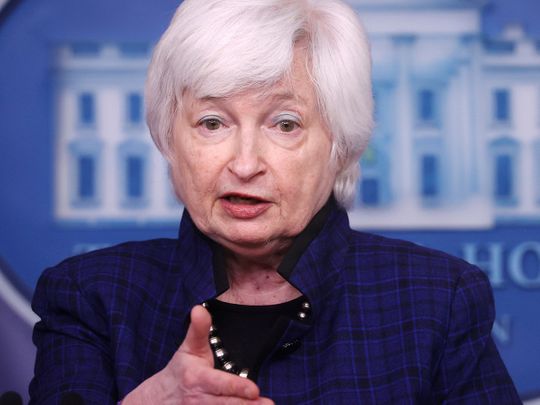
Washington: Treasury Secretary Janet Yellen warned that her department will effectively run out of cash around Oct. 18 unless legislative action is taken to suspend or increase the federal debt limit, putting pressure on lawmakers to avert a default on US obligations.
"We now estimate that Treasury is likely to exhaust its extraordinary measures if Congress has not acted to raise or suspend the debt limit by October 18," Yellen said in a letter Tuesday to congressional leaders. "At that point, we expect Treasury would be left with very limited resources that would be depleted quickly. It is uncertain whether we could continue to meet all the nation's commitments after that date."
Financial market concern intensified a bit around the date following Yellen's letter. Treasury bills maturing in mid-October became cheaper relative to other maturities, with investors demanding slightly higher interest rates around Oct. 15.
Yellen's letter comes a day after Republican senators blocked legislation, attached to a stopgap spending measure, that would have suspended the debt ceiling until December 2022. That left Democrats no clear alternative to overcome the Senate filibuster except using a budget procedure that could take nearly two weeks.
Following the Senate's 48-50 vote, Majority Leader Chuck Schumer didn't immediately signal Democrats' next step, instead castigating Republicans for "one of the most reckless, one of the most irresponsible votes I have seen taken in the Senate."
The GOP maneuver sets the stage for a protracted debate over debt that Republican lawmakers hope will help them portray Biden's expanded child tax credits, paid family leave and new benefits for Medicare recipients as out-of-control government spending. An eventual Democrat-only vote to raise the debt limit would provide fodder for election attack ads.
Tanking economy
Democrats as of late Monday hadn't given up on the idea of forcing Republicans to join them to address the issue, however - raising the risks of financial-market distress as the Treasury's deadline for running out of cash looms.
During the debt limit battles of 2011 and 2013 investors grew worried as default neared. In 2011, yields on effected Treasury bills began to surge about eight days ahead of default and in 2013 about 20 days beforehand. Stocks tumbled in the aftermath of the 2011 sovereign downgrade by S&P Global Ratings.
The debt standoffs also have direct costs to taxpayers because of the higher interest rates investors demand because of the payment uncertainty.
Delays in raising the debt limit in 2011 forced the government to pay $1.3 billion in additional borrowing costs that year, not including any impact on the Treasury's costs in later years, according to a U.S. General Accountability Office assessment the following year.
Democrats can raise the debt ceiling on their own through a process called reconciliation, which bypasses the filibuster in the Senate. The most likely scenario would have Democrats revise an already-passed budget resolution that set the stage for an economic package of as much as $3.5 trillion, creating separate legislation to raise the debt ceiling.
The process would involve two lengthy Senate debates and "vote-a-ramas," where scores of amendments could be offered. Once the Senate is finished, the House would have to clear the amended budget resolution and the debt-cap hike. Other Democratic lawmakers have stopped short of ruling out the go-it-alone strategy.
Yellen's new estimated timeline - an update from the "some time" in October she had previously advised - suggests Democrats will need to get started on the reconciliation process within days if they opt to pursue that solution.
"While this is our best estimate, the federal government's cash flows are subject to unavoidable variability," Yellen said in her letter to House Speaker Nancy Pelosi, Schumer, Senate minority leader Mitch McConnell, House minority leader Kevin McCarthy and other top lawmakers. "This uncertainty underscores the critical importance of not waiting to raise or suspend the debt limit."








